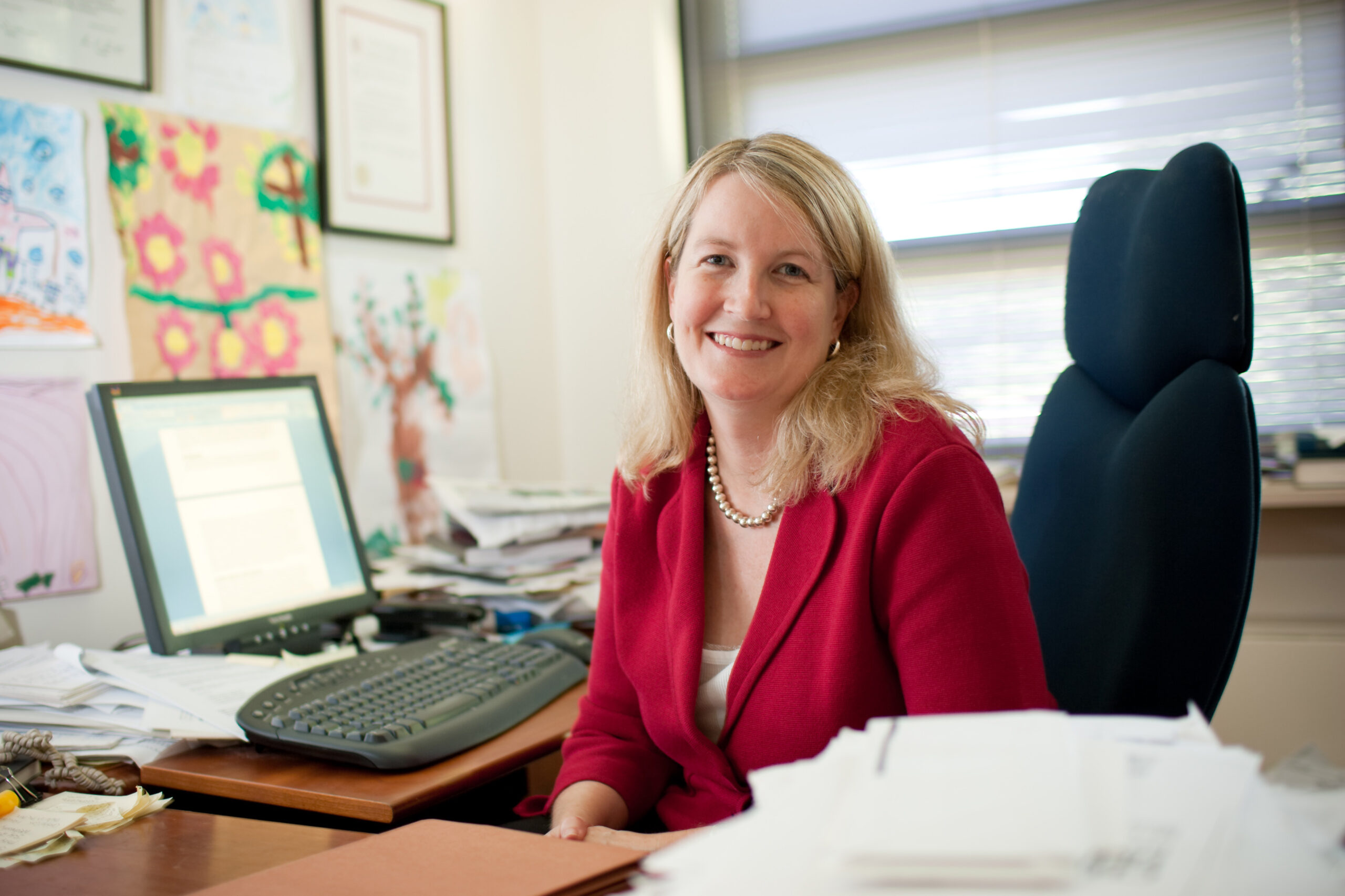The unexpected, controversial ouster of Dedman School of Law dean John Attanasio at Southern Methodist University last year left many in the Dallas legal community wondering what type of successor would be brought in to take the reins during one of the most challenging times in legal education. Would it be another in a long line of ivory tower academics? Or would it be a legal reformer, eager to usher in sweeping changes in the name of producing graduates who are “practice ready?” As it turns out, after a national search that ended in December, the choice is someone who combines elements of both, along with a healthy dose of hands-on administrative experience.
Meet Jennifer M. Collins, who will start July 1, 2014, as the Judge James Noel Dean of Dedman School of Law. She arrives at the Hilltop from North Carolina’s Wake Forest University, where she has been serving as vice provost after joining the law school faculty in 2003. Collins is something of a rarity in legal academia. Although her impressive résumé boasts many of the usual sterling credentials that seem to pre-ordain one for life in the academy (Yale undergraduate degree, Harvard law degree, a federal clerkship on the Ninth Circuit Court of Appeals), she also spent extensive time in private practice. After brief stints with a Washington, D.C., law firm and the U.S. Department of Justice’s Office of Legal Counsel, Collins began an eight-year stretch as an Assistant United States Attorney for the District of Columbia, where she worked in the homicide section and prosecuted more than 30 jury trials.
‘I’m happy to see my alma mater chose someone with practical legal experience,’ says Robert Bogdanowicz, a 2008 Dedman grad.
Collins says that this experience enabled her to develop a skill set that has been equally important to her roles of prosecutor, law professor, and administrator—that of being a storyteller. “Facing a jury of 12 skeptical citizens being called upon to decide whether an accused murderer should be found guilty is great preparation for helping a class full of anxious law students understand the beauty and complexities of the law,” Collins says. “Being able to share information in a compelling way is critical to my role as an administrator making presentations to faculty, students, parents, trustees, and donors.”
That real-world experience has done more than help her and provide her with credibility with students. It also served as a launching pad for Collins’ scholarly work. She is the author of a book and numerous law review articles on families and the criminal justice system. She’s working on a research project about crime on college campuses as well. That work has been influenced by her experience in the Wake Forest Provost’s Office, where she helped revamp the university’s approach to dealing with sexual assaults on campus. Knowing that this issue has been a concern at SMU—even spurring the creation of a joint task force last year—Collins says she “welcomes the opportunity to work with the task force.”
The new dean will take over at a time that might well be described as a tipping point in legal education. The number of people taking the LSAT in October 2013 was 33,673, down sharply from 60,746 who took the exam in October 2009. Most observers attribute this mounting disenchantment to dismal job prospects. According to American Bar Association data, only about 56 percent of 2012 law graduates nationally found permanent, full-time employment requiring a J.D. within nine months of graduation. While SMU Law has enjoyed considerably higher placement numbers (86 percent for the class of 2012), Collins is sensitive to concerns about the school’s future.
“SMU has so many things going for it already, like a strong local market and a great faculty, but I agree that law schools need to do more to differentiate and distinguish themselves,” she says. Collins says concerns about the legal job market are “a huge priority. It’s vital to maintain and expand upon our ties to the alumni base, the legal community, and the business community. I’m eager to work with people like Wayne Watts [general counsel for AT&T], who was on the search committee that chose me. And, with my husband being a partner [in a] law firm, I get regular feedback about law firms’ expectations.”
Another persistent concern is the cost of legal education. The average student loan debt for a 2012 graduate of a private law school was $122,158, and SMU’s own tuition remains in excess of $44,000 a year. Collins says she is “absolutely concerned,” and pledges to look at fundraising and other potential avenues to minimize the debt burden of SMU law students.
On many fronts, from making law school more affordable to expanding opportunities for more experience-related learning through clinics and externships, Collins seems inclined to take things slowly. “I have to spend some time listening and learning. I have a number of ideas, but SMU is already doing so many things right in these regards,” she says.
One thing she does identify as an area in which many law schools lag is embracing technology and preparing students for its importance in managing a law practice as well as in substantive areas of law. With electronic discovery and computer-assisted review of documents assuming greater roles in modern law practice—and reducing the labor-intensive role traditionally played by young associates—Collins would like to see technology as “something we can think of in terms of our teaching. In my area [criminal law], I’d love for students to be able to follow a virtual case in its various stages. Plus, it’s an opportunity to enhance skill-based teaching. Students are different today. Their needs in the classroom are different. We need to be open to teaching in different ways.”
Collins describes herself as “a collaborative leader,” one who welcomes “the give-and-take and opportunity to have a shared management vision. I respect the culture and ethos of the law community.” And while former dean John Attanasio was criticized by some for not advancing the school in the all-important U.S. News & World Report law school rankings, Collins is quick to credit his leadership while acknowledging that work remains to be done.
“It’s an honor to follow in John’s footsteps; he’s done so much,” she says. “Although I don’t feel rankings are always an accurate reflection of a school’s value, I want to be sure SMU and its faculty get the credit they deserve. I’m very impressed with the students—they seem very thoughtful and engaged. And the faculty is not just incredibly impressive, but also passionate about the future of SMU.”
Asked about new competition looming from two new public law schools in the area—the UNT Dallas College of Law is expected to welcome its first class in the fall, while Texas A&M recently finished the acquisition of Fort Worth’s formerly private Texas Wesleyan School of Law—Collins is philosophical. “SMU Law has been very fortunate for many years,” she says. “It’s not a unique position to be in—many law schools in major cities have already had to deal with multiple competitors. All we can do is continue to offer students the best education they can get and the best job placement prospects.”
The appointment of this self-described “big-city girl” and avid sports fan (she’s a diehard Boston Red Sox and New England Patriots fan) has been greeted with enthusiasm by the SMU community. President Gerald R. Turner points to her lengthy tenure as a federal prosecutor and her service in academia as making her “uniquely positioned to continue the Dedman School of Law tradition of preparing men and women to enter a competitive legal market.” Darrell Jordan, a prominent SMU alum and managing partner of the Dallas office of the national law firm Dykema, applauds the move as well, saying “the fact that she’s prosecuted and has real-world experience will be an asset.” More recent graduates with an eye on the value of their degrees sound a more cautious note of optimism. Robert Bogdanowicz, a 2008 Dedman grad who’s now an associate at Dallas’ Deans & Lyons, says, “The arrival of a new dean can have a significant impact on the value of your diploma. That said, I’m happy to see my alma mater chose someone with practical legal experience, something sorely lacking from legal academia as a whole.”
In sum, Collins counts maintaining and improving SMU’s performance in academic rankings and job placement statistics at the top of her agenda, along with strengthening the school’s ties to alumni as well as the Dallas legal and business communities. For this former federal prosecutor, after all, SMU and its extensive, influential network of alumni and donors will soon become the most important jury of all.






